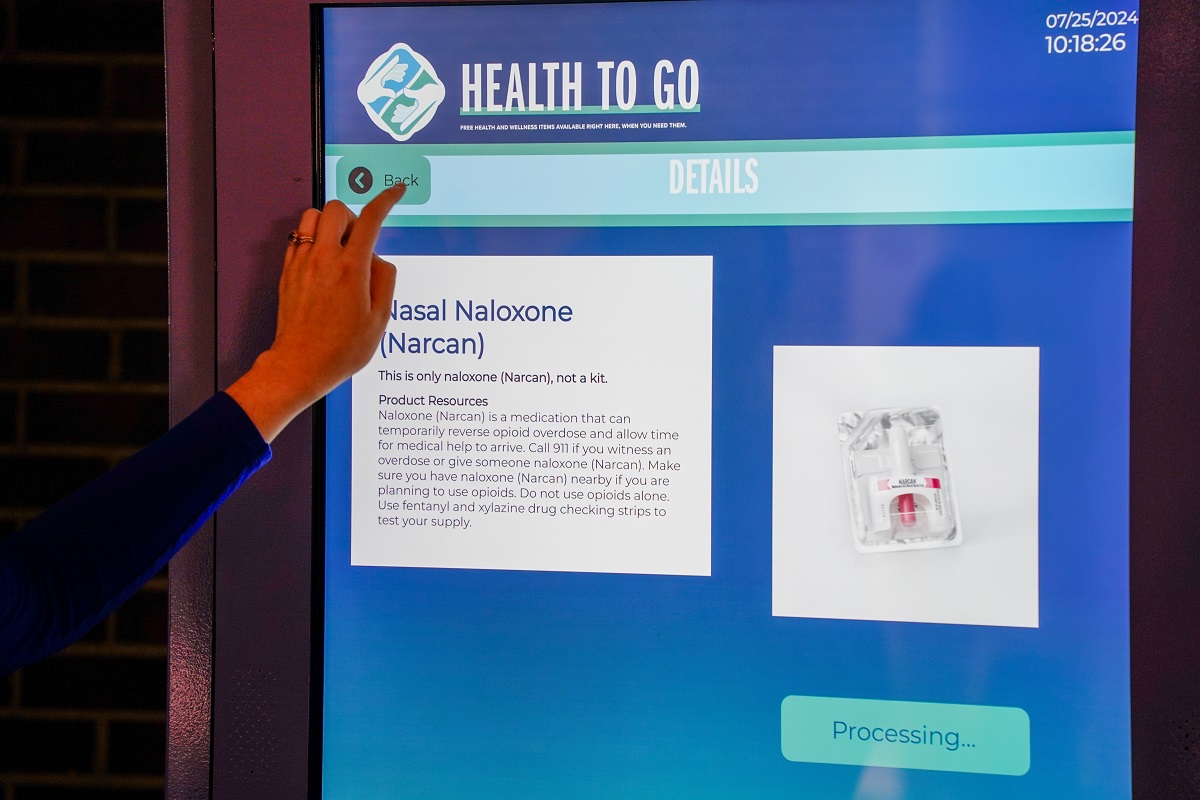‘Health To Go’ vending machine brings free health resources to citizens of Harrisburg

Penn State College of Medicine is partnering with UPMC, the UPMC Pinnacle Foundation and Dauphin County to launch a new smart ‘Health To Go’ vending machine that can provide free health, wellness and personal care items and connect users to community services.
The vending machine is accessible to the public 24/7 and located outside the entrance of the emergency department at UPMC Harrisburg at 111 S. Front Street. This smart vending machine has an interactive, touch-screen interface and is among the first of its kind in Pennsylvania.
“This vending machine provides free wellness and personal care items and connects people to local services and resources they need. As the machine gets used, we will be able to learn more about these needs and adjust the machine’s supplies and services accordingly, to best meet the needs of the community,” said Dr. Alice Zhang, co-lead investigator and assistant professor of Family and Community Medicine at the College of Medicine. “We received a lot of input and support from our partners and the community when designing this vending machine, so we would also like to thank them for this collaborative effort and making this project possible.”
“UPMC Pinnacle Foundation strives to promote health and wellness in our communities and many folks lack of access to crucial health and hygiene necessities due to cost, societal pressures, unsafe living situations, or social stigma,” said Jessica Ritchie, president, UPMC Pinnacle Foundation. “We hope unimpeded access to these crucial resources will lead to better hygiene, reduced harms and improved health outcomes.”
In addition to dispensing health and personal care items, the machine can also help connect users to community services and resources, like food, shelter, health care or social services.
Common items available for dispensing include:
- Naloxone opioid overdose reversal kits
- Xylazine and fentanyl test strips
- Medication disposal bags
- Personal care items
- Male and female condoms
- Pregnancy tests and menstrual kits
- Wound care kits
- HIV and sexually transmitted disease self-test kits
“In the emergency department, we often encounter patients whose health has been compromised by sexually transmitted diseases, substance misuse disorders, and other conditions, such as a lack of food or housing,” said Dr. Anthony Guarracino, chair of emergency medicine at UPMC Harrisburg. “We’re proud to partner with Penn State College of Medicine to bring preventive health items and access to life-sustaining services to the citizens of Harrisburg.”
A unique feature of the smart vending machine is its ability to automatically capture information on its use — for example, what items are viewed and dispensed, and when, or what items are running low and need to be re-supplied. Using its large touchscreen, the smart vending machine can also anonymously ask the user questions about their demographics, experiences, preferences and needs to help improve the services and best serve the community.
“As our Human Service workers witness every day, it is critically important that we bring health products and services directly to the people we serve, so that they have not only what they need, but when they need them,” said Commissioner George P. Hartwick, III, who has oversight of Dauphin County’s Human Services Department. “This centrally located, state-of-the-art vending machine will dispense everything from naloxone and medication safe-disposal kits to toothbrushes and tampons so we can get these much-needed products directly into the hands of those who need them most. These products could save a life. The ‘smart’ nature of this machine can also lead to information, education, services and support down the road so that “health-to-go’ becomes ‘health-to-stay.’”
During its first month of operation, an estimated 118 individuals received more than 500 items, including approximately 200 hygiene kits, 150 safer sex kits, 75 wound care kits, and 60 naloxone kits. According to Penn State College of Medicine and UPMC representatives, the early high utilization of the machine highlights the need for additional resources in the community.
“We are committed to helping the communities we serve get access to health care – including crucial addiction care,” said Dr. Aleksandra Zgierska, co-lead investigator, and endowed professor and vice chair of research at the Department of Family and Community Medicine. “The vending machine project was developed in collaboration with our community partners to serve its members. We believe this machine has a great potential to meet the community where they are and help them get the care they need and deserve.”
As Pennsylvania’s only land-grant university, the College of Medicine’s mission is to improve the health and well-being of communities throughout Pennsylvania. The smart vending machine in Harrisburg is the first in Dauphin County and the second in south-central Pennsylvania launched by the College of Medicine this year, with plans for more machines to come to the region.
If you're having trouble accessing this content, or would like it in another format, please email Penn State Health Marketing & Communications.
